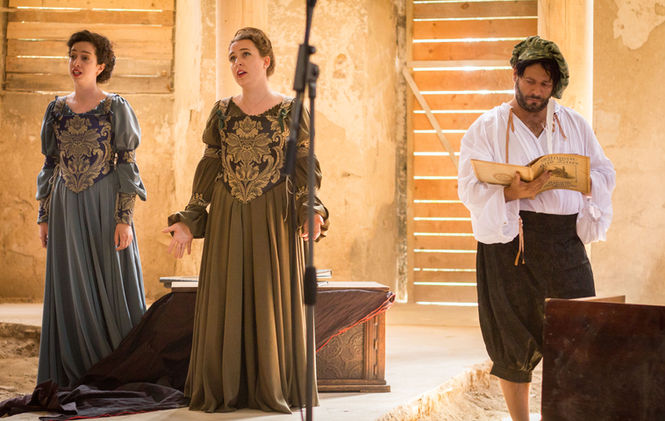Music projects without borders
The Silesian Apollo
Martin Opitz and the music
Heinrich Schütz (1585, Köstritz - 1672, Dresden) and Martin Opitz (1597, Boleslawiec - 1639, Gdansk
The "father of German poetry", the most important son of Bunzlaus (today Bolesławiec) was one of the first and like no other to define the foundations for the literature of the German-speaking area and thus achieved great things for the history of this literature. After an initial collaboration with Heinrich Schütz, who brought the musical renaissance from Italy to Dresden, Martin Opitz began a long and fruitful collaboration with many composers of his time. Heinrich Schütz wrote one of the very first operas based on his libretto from a translation of the original text (by Rinuncini), for which Jacopo Peri composed "Daphne". The first German opera was written, "Dafne".
Schütz, a composer who is best known to us for his outstanding madrigals, has set 12 poems by Opitz to music. But also other composers who were active in Saxony, such as Andreas Hammerschmidt, who comes from Bohemia and lives in Zittau, and Constantin Dedekind, who works in Dresden. This fact led us to name the project of homage to Martin Opitz "The Silesian Apollo". In fact, we find him depicted on the title page of Constantin Dedekind's song collection "Elbianische Musenlust" where he plays in a duet with Apollo, the Greek god of music and poetry.
So who was the man who not only laid the foundations for German poetry, but also translated poetry into German from many other languages, from ancient Greek, from Latin, and from Dutch or French. From the English he translated Sir Philipp Sidney's "Arcadia". Opitz lyrically sings about a world of peaceful existence in harmony with nature, the joy of life and virtuous love.
We will try to answer this question in our project. This will be done not only through a lecture and the publication of a brochure with the translation of selected poems into Polish, in order to make today's citizens of Bolesławiec more aware of their great poet. In addition, we want to transport the audience back to the time when people longed for a peaceful renaissance after the end of the Thirty Years War. Where to meet again to sing songs about love, wine, joy, virtue and moderation.
At the end of a workshop in Görlitz, a scenic concert with the madrigals will be performed at three locations in the region, of course also in Bunzlau, Opitz's hometown, in costumes and surrounded by the natural set of corresponding architectural monuments.
Project :
Martin Opitz >> Poetry >>
Program of the concert >> Dramaturgical conception >>
Workshop >> Ensemble >>
Events >>
Book with CD >>
Sponsors-Partners >>
The project is funded by the Federal Government Commissioner for Culture and Media through the Cultural Department for Silesia at the Silesian Museum in Görlitz and Central German Baroque Music in Saxony, Saxony, Anhalt and Thuringia eV




PROGRAMM
Constantin Christian Dedekind
Dichter und Komponist in Dresden
Reinsdorf, Anhalt-Köthen 1628- Dresden 1715
Heinrich Schütz
Nach Opitz
1. Itzt blicken durch des Himmels Saal SWV 460.
2. Die Erde trinkt für sich SWV 438.
3. Glück zu den Helikon SWV 96.
Aus "Salomons Hohenlied" (übersetzt von Opitz)
4. Nachdem ich lag in meinem öden Bette SWV 451.
5. Liebster, sagt in süssen Schmerzen SWV 438.
6. Läßt Salomon sein Bette nicht umgeben SWV 452
Madrigale von Heinrich Schütz nicht nach Opitz
7. Teutoniam dudum belli SWV 338.
Andreas Hammerschmidt
Aus Geistlichen Dialogen II
Salomons Hohenlied - Andert Teil
Arien
11. Wenn Gott auf unsre Lenden.
Constantin Christian Dedekind
Aus "Elbianische Musenlust"
Zehn Opitzianische
Die Madrigale

DAS ENSEMBLE
Shira Miriam Cohen Sopran
Anna Bachleitner Sopran
Ioulia Spanou Alt
Roberto Jachini Virgili Tenor
Nathaniel Kondrat Bass
Enrique Gómez-Cabrero Fernández
Dozent, Dirigent und 1.Barockvioline
Lukas Hamberger 2.Barockvioline
Ela Kaluchiewicz Viola da gamba
Michele Cinquina Dozent und Theorbe
Dimitri Dimitrov Orgel



















































